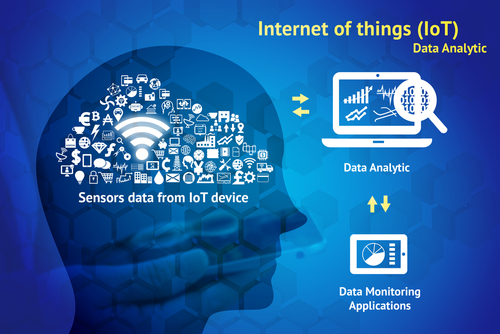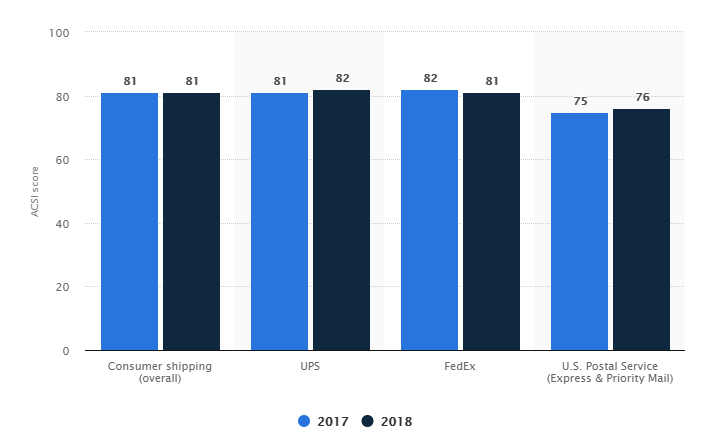Category: Business
A 2017 study on the big data market worldwide showed that by the end of the year, nearly 53% of all companies had adopted big data analytics in some form to optimize business performance. The talent market too witnessed an increased demand for professionals with expertise in big data. We are the crossroads of a huge transformation exercise wherein data is the new oil. From wristbands to connected cars and automated factories, today’s enterprises deal with an enormous amount of data that they need to utilize for growth and innovation. This is true for any industry, be it financial, manufacturing, life sciences, or any other field. As the volume of data flow grows, the technology needed to manage and utilize it is in need of an innovative makeover.
The businesses of today need the next generation of custom software tools to harness the power of big data. They need to set up a technology backend that can support and supply data to multiple enterprise applications at different units in their businesses. Custom application development practices need to incorporate the changing philosophy of big data streams into their core operational procedures. Many organizations find it difficult to empower their software or technology team with knowledge on incorporating big data methodologies into their development practices. This is one of the key reasons why only 37% of companies have been successful in transforming into data-driven organizations, even though over 85% are trying to achieve this feat. So how can enterprises of today explore the power of big data using custom software development capabilities?
How to use Big Data to re-define your custom software development landscape
To answer the question, we decided to provide some tips for organizations to create valuable business results by incorporating big data into their custom software development cycle. Here are 5 ways to derive tangible business value from your investments in big data within software development.
1. Prepare for a mobile-first strategy
Over 50% of the US population owns a smartphone, and by 2020 it is expected that over 10 billion smartphones will co-exist with humans worldwide. No matter which industry you operate out of, if your customer-facing points do not have a mobile focus, then you are losing out to competition. By incorporating a big data philosophy, every custom software application that your organization builds will be able to handle data inputs from billions of mobile devices. This data can be analyzed, and insights can be used to direct content to mobile devices. And there is another scenario: if your business wants to be at the forefront of mobility, then tuning your custom software development practice to include big data concepts is a perfect way to get the heads-up on the competition.
2. Respond faster to customers
Your core business systems might already be engineered to provide support to your associates at customer facing avenues. With the velocity of requests coming in from diverse customer channels today– the internet, social media, physical POC’s, etc.– it becomes difficult for your employees to provide personalized attention to each customer. However, if your custom software development team is equipped with the skills to incorporate big data management trends within their development model, the resulting customer experience would be seamless. Ready-availability of information would help associates run the gamut of customer queries across channels simultaneously and with personalized attention. A faster response will pave the way for increased customer loyalty and will ultimately reflect positively on your business revenue.
3. Bolster automation efforts
From autonomous production facilities to automated email campaigns, enterprises worldwide are investing heavily in automating business processes. Productivity improvements, elimination of errors and biased decisions, efficiency, etc., are some of the key reasons cited. However, for each process within a business, the saga of automation can do wonders only if they are equipped to explore and manage all possible data points within them. This is where your software engineering teams need to see the bigger picture while building apps for every department. The applications need to be extensible for data flows from various sub-functions and units within teams. Only when processes and teams become data-driven will there be an opportunity to automate the process. Thus, having a big data approach in your custom software development practice will ensure that the future of automation in your business is moving in the right direction.
4. Set the tone for artificial intelligence
Just as in the case of automation, enterprises need to be data-driven if they are to incorporate transformative technology transitions like artificial intelligence. For algorithms to decide the future of customer experience, the first step is for these systems to learn about your customers and your business. This learning is facilitated by data insights that are generated by your custom software applications powering each unit of your business. Hence, by driving a culture of big data thinking within your custom software development team, the foundation for AI-enabled systems is well cemented into your base. Growing this in into future recommendation engines, conversational bots, autonomous business units, etc., will be a seamless activity.
5. Remain competitive in the digital era
This is a culmination of all that we have mentioned in the previous points. In an increasingly digital age, businesses can go down the drain in a very short time if they fail to innovate on the digital front. Data is the basic unit of every digital transformation initiative, and if your business isn’t equipped to generate and harness the power of data, then your chances of survival will be slim in the long run. This concept needs to be instilled at the grassroots level of your custom software development practice. Only if your business applications can handle the volume, veracity, and velocity of big data, will your business be able to serve the next generation of digitally savvy consumers.
Now that you know the importance of having a big data methodology in your custom software development practice, what you need to do is to start building awareness about it. Let your teams know the growing needs of the digital age and how data becomes the fundamental DNA of every business process. If your core business operations are not serving the tech industry, then it is best to have a solid technology consulting partner for your custom software development needs. Fingent software development company, we work with some of the world’s best businesses to deliver meaningful customer experiences with big data incorporated custom software development services. Talk to our experts today to learn how we can tap the hidden potential of your enterprise data.
Stay up to date on what's new

Featured Blogs
Stay up to date on
what's new



Talk To Our Experts
Automatic control, which has been the foundation of automation, has been here for centuries. As far back as the 17th century, systems with automatic control devised for the regulation of steam engines, temperature control, and other applications. Automation has come a long way since then. Its application in the Health care sector that has been especially noteworthy since it has made huge strides in saving costs, labor, and lives! This blog will have an in-depth into how automation is revolutionizing the health care sector.
The Healthcare Industry – An Overview
Before we get into the role automation has played in the healthcare sector, it makes sense to have an overview of how the Healthcare Industry has been doing. Innovation and R&D in the past few decades have contributed to more effective medicines, improved diagnostic aids, and technological solutions to non-invasive procedures. These are naming just a few of the accomplishments in the healthcare industry.
Along with the accomplishments, there have been a few challenges as well. The availability of quality and affordable healthcare for its people is an important indicator of how well a nation fares on the Human Development Index (HDI). The problem is that even developed countries are struggling to meet this need effectively. There are many reasons for this and here are a few of them.
1) Rising Expenditures
There are huge investments being made in the healthcare sector in terms of funding drug discovery and providing facilities. This often translates into enormous hospital bills, which reaches down to patients.
A Research Gate study showed that supply expense per patient admission in the US was estimated to be $4,470! The disproportionate constraint of health insurance reimbursements makes the problem worse. The growing demand for procedures requiring medical devices is a further strain on the pockets of health care providers. For example, the National Center for Health Statistics (NCHS) predicts that the number of knee replacements will expand by 673% by the year 2030. Identifying R&D opportunities for drug discovery also involves large expenses and involves several data assimilation and regulatory challenges. Large volumes of data and insights are involved, and this expends time and cost.
Balancing costs and health outcomes require an intelligent assessment by formulary committees, which takes into consideration numerous data variables.
2) Appointment Scheduling
A survey of nearly 500 healthcare professionals on the Top Challenges for Medical Practices showed that lost revenue from broken appointments was the top challenge with 49.5% respondents voting for this. Other challenges included:
- Low response to recall efforts
- Not enough staff time to call patients
- Keeping updated patient contact information
- Lack of an efficient way to reach patients via text message
- Not connecting with enough patients with a reminder phone call
3) Security
Patients entrust private information to health care providers, including social security numbers and financial details. The theft of such data could be catastrophic, to say the least. Reports show that the highest data breach resolution costs in the United States are for healthcare data breaches, which typically cost an average of $408 per record. The time taken to identify and contain a breach includes significant losses. Above all, the loss of trust and reputation with customers could deal a fatal blow to health care providers.
What is Data Automation
Automation is when manual tasks are reduced by the use of information technology. Repetitive tasks that require least human intervention benefit the most from automation. Data automation is the process when programming takes care of the assimilation, storage, and analysis of data.
Data automation usually involves:
- Extraction: Multiple open data sources are mined for relevant information.
- Transformation: The data is converted into a format that can be used by machines.
- Loading: The data is then fed into the system to serve as the raw material for automation.
Big Data Automation (BDA), is a broad concept that makes use of innovation and IT resources to create value. A few aspects of Big Data automation were brought out in a whitepaper by WhereScape. The WP has Barry Devlin describing Big Data automation as follows:
In addition to reducing manual labor in the collection and analysis of data, automation can help reduce administrative workloads and improve patient care on many levels. Robotic Process Automation (RPA) is the next level in automation. This uses machine learning and AI to effectively handle tasks that are done manually. RPA has made huge strides in Healthcare. A Deloitte article entitled “RPA in Health Care Can Improve Outcomes for All “puts it well: ‘RPA can help health care and life sciences organizations collect and translate patient and transactional data into meaningful, actionable formats; streamline compliance-related processes; and relieve employees of some tasks they now perform.’ Blog: Automation in Healthcare: Pioneering Exceptional Care and Streamlined Efficiency Here are some ways in which automation is revolutionizing the healthcare industry: As we discussed earlier, a major cause of rising healthcare costs is the growing demand for medical devices and the innovation costs involved in drug discovery. Automation can greatly aid in this. Recently, FDA Commissioner Scott Gottlieb revealed a budget action plan, which focused on modernizing drug and device production and using innovation to minimize costs and advance public health priorities. Some of the highlights were to enlist “as many as 10 million electronic medical records to speed the regulator’s ability to address emerging safety concerns for drugs, biologics and medical devices.” This would help in fast-tracking the assessment of safety and effectiveness of the drugs and devices. The collection and analysis of data would also support drug discovery and new product functions. Consider the savings in cost and time if tasks like scheduling appointments and reminders would be automated. Apps that automate these tasks have freed up valuable staff and resources allowing them to concentrate on patient care. Some features that these apps make possible: A manual error is often the cause for most security breaches. By automating data processing and sharing, healthcare companies can ensure that handling of data by humans is minimized. With the help of AI and automation, healthcare providers can enable alerts, monitoring, and prioritization of abnormal behavior. Predictive analysis, diagnosis, and recommendations can also be automated ensuring that the system continuously learns to detect and eliminate security vulnerabilities. While we considered just three challenges and the ways in which automation is helping to resolve these challenges, there are many more. Fingent works with various clients in the healthcare sector to design customized applications to help automate their critical processes. Drop us a message to learn how we can help. How Automation Is Revolutionizing Health Care Sector
1) Solving Rising Costs
2) Appointment Scheduling Solutions
3) Security Solutions
Stay up to date on what's new

Featured Blogs
Stay up to date on
what's new



Talk To Our Experts
Hotels leave no stone unturned in today’s extremely competitive business environment, and a key weapon in their arsenal is technology. However, with technology in a constant state of flux and constantly unlocking new opportunities to improve customer satisfaction and boost internal efficiency, hotels have their task cut out leveraging technology to remain one-up on competition.
6 Ways Hotels Can Use Technology to Improve Guest Experience
1. Online Bookings
The most apparent manifestation of technology in the hotel industry is hotel bookings. The internet also obviously makes accessing information easy, and transparent. Data such as check-in and checkout times, rates, facilities on offer, and other key details allow guests to make informed decisions. Surveys show that around 48% of smartphone users in the U.S are comfortable researching, booking and planning their entire trip to a new travel destination using only a mobile device.
Popular websites such as booking.com, agoda.com, hotels.com, and even websites of hotel chains, such as ibis.com and others are now the default way people search for room, deals and make bookings. There are already websites that compare deals and offers from various websites, and with technology advancing, the day is not far off when potential guests can experience their room in a virtual reality setting, before making a booking.
According to the Oracle Hospitality report, 35% of guests said they would prefer the ability to schedule room cleaning and 26% said they would like to receive a smartphone notification to show if their room was being cleaned.
Improved analytics may also allow guests to select hotels with facilities that best match their tastes, interest, and convenience. Hotels that do not embrace technology and facilitate such options for their guests stand to miss out big time.
2. Online Reputation
Today’s customers are highly knowledgeable and see through marketing pitches instantly. They are more likely to take official communication, even if true, with a pinch of salt. They increasingly rely on social media to seek reviews and recommendations from genuine travelers. In such a state of affairs, hotels are increasingly investing in enhancing their social media presence through brand ambassadors, brand advocates, influencers and others. Large hotels now even have dedicated social media teams, scanning the internet, and responding to bad reviews, hoping to make amends.
A positive social media reputation works wonders in terms of hotel occupancy. About 87% of TripAdvisor users feel more confident when they read travel reviews, and about 98% find such reviews “accurate of the actual experience.”
Technology has shifted the balance of power toward guests, and hotels have no option but to work harder to match customer expectations.
3. Enhancing Guest Experience
The latest technological advances contribute greatly to making check in and check out, and other guest related processes easy, seamless, and fast. Self check-in and checkout through electronic kiosks, online check in, online payments, and more all does away with the lines and long wait times, both major pain points for long. The latest technology allows guests use their smartphones as the room key, enabling them to proceed straight to their rooms. Likewise, guests can check out with a few clicks of the smartphone, and avoid the reception altogether.
Hilton Worldwide already offers guests the ability to check in and out, select their room, check maps and make extra requests or purchases, from their smartphones. For those who think such benefits are too exaggerated, all they need to do is try and check in or check out of a Las Vegas hotel on Sunday noon.
Here are some other ways hotels are using hi-tech to enhance their guest experience:
-
Voice Controlled Room
Wynn Hotel & Resort, Las Vegas has implemented Amazon Echo to maximize their customer benefits. With Amazon’s Alexa voice assistance, guests of Wynn can control the lighting, temperature, draperies, and TV in their rooms. Here’s a video that shows how it’s all done.
-
Robotic Butlers
Aloft in Cupertino has implemented hi-tech features to optimize hospitality for guests. In addition to keyless entry via Aloft smartphone app and Apple TV in every room, Aloft Cupertino employs a robotic butler called Botlr to deliver 24/7 customer services of all kinds.
-
Digital Concierge
Renaissance Midtown Hotel, New York, features an interactive wall called The Discovery Portal. It’s a virtual concierge where guests are allowed to choose from categories of entertainment, dining and much more by stepping onto a circular hologram projected on the floor. In addition, the hotel also offers in-person concierge service to provide guests with in-depth information on what they have found in The Discovery Portal.
-
Robotic Luggage Storage
Yotel in New York is using robotics and artificial intelligence to delight guests while making the most of small spaces. To make check-in process more convenient, Yotel has touch-screen kiosks instead of front desk staffs and friendly robots to store luggage. Check this video to learn how guests at Yotel uses Robotic Luggage Storage.
4. Enhanced Targeting
From a marketing perspective, technology allows hotels to target their prospects and customers better. A basic manifestation is hotels reminding business guests about their meeting room schedules, targeting specific groups, such as those who have arrived for a convention, with special deals or offers, and more. The ability to connect with targets in real time reduces marketing costs while increasing effectiveness at the same time.
5. Streamlining Internal Processes
Technology allows hotels to become lean and mean, and make their internal processes more seamless and effective.
A customer relationship management (CRM) suite allows organizing and managing information from a central console, enabling guest relations executives to get the complete history of the customer when interacting with her.
A marketing automation suite makes it possible to customize interactions with guests, send automated emails to guests as required, and do more with less effort.
The future holds much more promise. The hotel could, for instance, leverage deep analytic to structure a package comprising of facilities best suited for the guests. For instance, if the guest is coming for a vacation, the package may include a sightseeing trip, and business visitors may be given access to meeting rooms.
6. Smart Solutions
Smart appliances and home automation solutions are a godsend for the hotel industry, with automated temperature control, lighting, alarms, TV, radio, blinds, and other technological innovation contributing to improved customer satisfaction, and improved services, while reducing overheads at the same time. Guests may, for instance, turn the air conditioner on through an app installed on their smartphone, to ensure optimal temperature when they enter the room. For the hotel, this is a much cost-effective solution compared to leaving the air conditioner on at all times.
With travelers becoming increasingly tech-savvy, hotels who do not embrace the latest technology to deliver innovative services to their guests stand out to lose big time. However, keeping abreast of the changing technology, and developing cutting-edge solutions based on such technology is a big challenge for hotels, and would, in any case, be a drag on their core focus.
Hotels would rather do well to partner with our experienced and talented team to develop technology related solutions. Get in touch with us today to know how our extensive experience in developing highly customized solutions for hotel and related industries can benefit your business.
Stay up to date on what's new

Featured Blogs
Stay up to date on
what's new



Talk To Our Experts
IoT and data remain intrinsically linked together. Data consumed and produced keeps growing at an ever expanding rate. This influx of data is fueling widespread IoT adoption as there will be nearly 30.73 billion IoT connected devices by 2020. The Internet of Things (IoT) is an interconnection of several devices, networks, technologies, and human resources to achieve a common goal. There are a variety of IoT-based applications being used in different sectors and have succeeded in providing huge benefits to the users.
The data generated from IoT devices turns out to be of value only if it gets subjected to analysis, which brings data analytics into the picture. Data Analytics (DA) is defined as a process, which is used to examine big and small data sets with varying data properties to extract meaningful conclusions and actionable insights. These conclusions are usually in the form of trends, patterns, and statistics that aid business organizations in proactively engaging with data to implement effective decision-making processes.
Merging Data Analytics and IoT will Positively Impact Businesses
Data Analytics has a significant role to play in the growth and success of IoT applications and investments. Analytics tools will allow the business units to make effective use of their datasets as explained in the points listed below.
- Volume: There are huge clusters of data sets that IoT applications make use of. The business organizations need to manage these large volumes of data and need to analyze the same for extracting relevant patterns. These datasets along with real-time data can be analyzed easily and efficiently with data analytics software.
- Structure: IoT applications involve data sets that may have a varied structure as unstructured, semi-structured and structured data sets. There may also be a significant difference in the data formats and types. Data analytics will allow the business executive to analyze all of these varying sets of data using automated tools and software.
- Driving Revenue: The use of data analytics in IoT investments will allow the business units to gain an insight into customer preferences and choices. This would lead to the development of services and offers as per the customer demands and expectations. This, in turn, will improve the revenues and profits earned by the organizations.
- Competitive Edge: IoT is a buzzword in the current era of technology and there are numerous IoT application developers and providers present in the market. The use of data analytics in IoT investments will provide a business unit to offer better services and will, therefore, provide the ability to gain a competitive edge in the market.
There are different types of data analytics that can be used and applied in the IoT investments to gain advantages. Some of these types have been listed and described below.
- Streaming Analytics: This form of data analytics is also referred as event stream processing and it analyzes huge in-motion data sets. Real-time data streams are analyzed in this process to detect urgent situations and immediate actions. IoT applications based on financial transactions, air fleet tracking, traffic analysis etc. can benefit from this method.
- Spatial Analytics: This is the data analytics method that is used to analyze geographic patterns to determine the spatial relationship between the physical objects. Location-based IoT applications, such as smart parking applications can benefit from this form of data analytics.
- Time Series Analytics: As the name suggests, this form of data analytics is based upon the time-based data which is analyzed to reveal associated trends and patterns. IoT applications, such as weather forecasting applications and health monitoring systems can benefit from this form of data analytics method.
- Prescriptive Analysis: This form of data analytics is the combination of descriptive and predictive analysis. It is applied to understand the best steps of action that can be taken in a particular situation. Commercial IoT applications can make use of this form of data analytics to gain better conclusions.
There have been scenarios wherein IoT investments have immensely benefitted from the application and the use of data analytics. With the change and advancement in technology, there are emerging areas in which data analytics can be applied in association with IoT. For instance, actionable marketing can be carried out by applying data analytics to the product usage. IoT analytics will also allow the increased safety and surveillance abilities through video sensors and application of data analytics methods.
Healthcare is one of the prime sectors of every country and the utilization of data analytics in IoT based healthcare applications can provide breakthroughs in this area. The reduction of the healthcare costs, enhancement of telehealth monitoring, and remote health services, increased diagnosis and treatment can be achieved using the same.
The utilization of data analytics shall, therefore, be promoted in the area of IoT to gain improved revenues, competitive gain, and customer engagement. By collaborating with the right strategy partner, businesses can couple data analytics with IoT to leverage data for gaining a competitive advantage.
Monetize IoT Data with Analytics [ Source : TEDx Talks]
Stay up to date on what's new

Featured Blogs
Stay up to date on
what's new



Talk To Our Experts
Top Challenges Logistics Managers Face Everyday
In the present scenario of global economics, logistics play a key role in facilitating trade and, by extension, ensuring the success of business operations. However, changing consumer demands, complex business models and growing client demands are just some of the top factors that pose a challenge in streamlining logistics management. So, how can logistics management personalize a conventionally standard service? Well, that is perhaps the top challenge that the industry has been facing in the last few years among others.
In their struggle to ensure optimum results, here are the top challenges faced by logistics managers today:
-
Cutting Transportation Costs
Growing fuel prices increased wages, and peaking inflation indexes all work in tandem to increase transportation costs daily. Cutting a few corners here and there does not always help in meeting the cost-cutting goals for transportation. Adopting a strategic approach to eliminate or reduce bottlenecks can prove pivotal in revamping network designs and consequently cutting down on transportation costs. 
Related Reading: Take a look at how a Transportation Management System can ease out the challenges of a 3rd party logistics service provider here
-
Processing Enormous Amounts of Information
Logistics managers have to deal with a lot of figures and data on a daily basis, besides coordinating smooth discharge of operations. The scope of their work includes ensuring the safety of the fleet and staff, fleet loading, cross-checking route maps, sanctioning fuel bills and so on. When done manually, this can be a time-consuming and tedious task that can take your focus off from attention to details. Investing in an automated solution or application for data entries, fuel bills, loading and unloading ledgers can go a long way in streamlining operations by allowing logistics managers the luxury of time to look at the finer nuances of operations.
-
Offering Segmented, Customized Services
Thanks to globalization, logistics management is turning into a multi-layered job where managers are expected to keep tabs on multiple supply chains simultaneously. You don’t just need to deliver goods on time but also offer customized services to different suppliers and customers in terms of packages and pricing. With the increase in customer expectation, some top rated shipping companies are striving to consistently provide maximum consumer satisfaction. A study by statista shows the 2017 and 2018 American customer satisfaction index (ASCI) scores for consumer shipping companies in the United States.
The keyword for success in this scenario is flexibility. Logistics operators need to offer personalized experiences to multiple segments of customers. Using a logistics management software that can automate the process of projecting different services to different customers can not only save time and effort on the managerial level but also bring added accuracy to data compilation and compliance.
Related Case Study: A constantly growing market like logistics cannot be managed only from a single device. How mobility solutions can ease logistics management and reduce its challenges is a read worthwhile. Find out more on iOS and Android development for logistics and supply chain company.
-
Manpower Management
Manpower is the trickiest of management responsibilities. You must maintain a humane approach toward the employees while keeping the best interest of your organization in mind. That can be a complicated equation in any managerial setup, but especially so in case of logistics management, as the drivers and staff are often placed in different geographic locations to maintain swift supply chain velocity. Decentralization of responsibilities, by appointing logistics managers in key locations, with appropriate work-order management solutions can help in more efficient management. For instance, work order software like ReachOut, helps logistics managers manage team utilization, team schedules, show proof of work, generate quotes and invoices and do much more. Managers can easily keep everyone on the same page and notify the staffs immediately about changes or provide them with live info they need.
The future of supply chain management How will technology and AI shape tomorrow [Source: University of Liverpool Online]
-
Compliance with Regulations
Transportation rules, regulations and security norms can vary from city to city, state to state, and quite obviously, from country to country. If you are a business catering to a global clientele, keeping up with these varying rules and regulations and familiarizing your staff with these, can pose a grave challenge. Collaborating with an efficient audit software can help eliminate these pains and improve your compliance, audit results and lead to quality investigations, thereby saving you from the trouble of getting on the wrong side of the law.
With the landscape of business operations continually changing, there is a shift in the ensuing challenges as well. Staying abreast with these changes and taking preemptive measure to ward off these challenges, is a sign of sound logistics management. However, solving logistic issues is not an impossible mission. Focusing on 3 major factors- Data, Process and Technology, can solve the biggest challenges of logistics.
To leverage cutting-edge technology and achieve efficient logistics solutions tailored to your needs, partner with Fingent, the leading custom software development company. Unlock the power of cutting-edge technology and elevate your logistic solutions to new heights. Reach out to us today for an unparalleled experience of promptness and precision.
Stay up to date on what's new

Featured Blogs
Stay up to date on
what's new



Talk To Our Experts
Artificial Intelligence is revolutionizing our lives. What used to conjure up images of robots taking over the world, is now a household word. Recommendation engines are reading our minds, virtual assistants are listening to our voices, and AI insights are transforming our businesses. AI is definitely here, and this blog will show you how.
Artificial Intelligence and Its Impact on Today’s World
Artificial Intelligence in its basic sense is defined as intelligence demonstrated by machines. In application, we can say that Artificial Intelligence is the ability of a machine to assimilate information and use it to make intelligent decisions. The attributes of problem-solving, decision making and other cognitive abilities that are associated with humans becomes artificial intelligence when applied to a machine.
The lifeblood of AI is data and its pulse run by an algorithm. Algorithms assimilate data and make sense of it through analysis. The resulting insight is what drives the decision making and problem-solving capabilities of Artificial Intelligence. Learning is by far the greatest attribute of Artificial Intelligence. The ability to learn and emulate human thinking and behavior is what makes AI nearly unstoppable. Its application in business is unmatched and is predicted to offer $15.7 trillion to the global economy by 2030!
Read more: AI Implementation For Businesses
Advanced Benefits of AI
The benefits of AI extend to much more than recommendation engines and chatbots. The ability of AI to make sense of data collected through the Internet of Things (IoT) will be a game changer in every aspect of our lives. Gartner predicts that 20.4 billion “things” will be connected by 2020. Artificial Intelligence can analyze the data collected by IoT technology and enable it in ways that we cannot even imagine.
A classic example of this is Idemandu, one of the most talked about topic in the AI world since the 2018 Consumer Electronics Show. In the words of its founder Pooya Abka, Idemandu is the first AI agent “that can understand customers’ service needs over voice, connect them to vetted service providers instantly, and learn about their personal preferences with time.”
Demonstrating what is possible with Idemandu, a Forbes article quotes this conversation:
You: “Hey Idemandu, could you ask my massage therapist to come to my place tonight preferably after 8? I’m feeling an annoying pain in my neck.”
Idemandu: “Sure, but your therapist is not available tonight. I found another very similar therapist who is available, would you like to see him at 8 pm tonight? If not, I can book your own therapist for tomorrow at 8:30 pm.”
You: “Okay, tell him to come tonight.”
Idemandu: “Okay, he’ll be there. I already briefed him about your pain.”
Imagine the possibilities with such an AI empowered assistant in every home and business. Google Duplex is another technology that is focused on helping us make hotel reservations. The Assistant will call your chosen restaurant, converse with the concierge, make a reservation for you, confirm with you if the reservation was successful or recommend another restaurant if it wasn’t!
The ability of AI and robotics to use concepts like AI-Augmented Contextual Analytics and Sentiment Analysis to better predict and direct customer experience was brought out in one of our recent blogs. You can read it here: https://www.fingent.com/blog/how-robotics-and-ai-can-improve-customer-experience-ctos-guide
How AI Is Transforming Various Business Sectors
The biggest impact of AI in business development. A survey conducted at the EmTech Digital conference revealed that respondents saw AI affecting these top three business outcomes:
- improve and/or develop new products and services
- achieve cost efficiencies and streamline business operations
- accelerate decision-making
We can see this impact in nearly every sector in business. Here are three sectors where the impact of AI has been seen the most:
Healthcare
86% of healthcare provider organizations, life science companies, and health technology vendors are using AI technology, says a 2016 report from CB Insights. These organizations are projected to spend an average of $54 million on AI projects by 2020. Few areas where AI is being used in healthcare are:
1) Data management – Medical records and other patient data can be accurately analyzed, stored and used to provide healthcare businesses with the right information at the right time. Time-intensive report analyses can be automated, diagnosis can be fast-tracked, and treatment can be better administered.
2) Virtual Consultation and Care – Healthcare apps using AI allow doctors, patients and, caregivers to communicate and coordinate effectively. Speech recognition, machine perception, and other AI enabled technologies, help to monitor the patient’s condition and administer effective treatment.
3) Precision Medicine and Drug Discovery – By screening complex compounds and existing medicines for specific attributes, drug candidates for pre-clinical drug discovery and development can be rapidly identified. AI can also help detect diseases and predict hereditary health issues more accurately and help design precision medicines for specific genetic make-ups.
For more applications of AI in the healthcare industry: https://www.fingent.com/blog/5-ways-big-data-is-changing-the-healthcare-industry
Finance
The assimilation and analysis of financial data is where AI shows its true potential, but there is much more that AI can do in the financial sector. AI in the Finance industry reduces costs, saves time and improves accuracy and efficiency in all areas of Finance. Here are a few applications:
- Security from Fraud – Security is the number one concern in the financial sector. AI helps in this by simulating fraud and cybercrime scenarios and coming up with preemptive security measures to combat security breaches. AI also helps in monitoring whether all security measures and regulations are being followed in the design of financial technology.
- Wealth Management – AI engines help analyze data associated with wealth management and provide insights on how to provide optimal benefits to clients. Creating personalized and tax-optimized investment offerings for clients becomes much simpler and accurate with the help of AI. AI also helps mitigate the unpredictability of the stock market, by incorporating features like blockchains and distributed ledgers.
- Digital Assistants – AI now assists with banking transactions and finance in nearly every household. AI assistants like Alexa, Siri and others are used to make financial transactions. Voice assisted banking is being made possible with banks like Barclays coming up with technology to enable money transfer through voice assistance software.
Read more about how predictive algorithms and AI will rule financial services: https://www.fingent.com/blog/how-predictive-algorithms-and-ai-will-rule-financial-services
Transportation
AI is being used widely in the transportation sector and these are a few areas where it is making an impact:
- Automation – While driverless cars are what comes to mind when we talk about AI and automation, the role of AI in automobile manufacturing is of equal import. Tesla’s automated manufacturing systems in its factories is an excellent example of the capabilities of AI in automobile manufacturing.
- Cloud based conveniences – With the help of AI and cloud computing, automobiles are being packed with features like suggestions for gas stations when the fuel is low, favorite restaurants on the route and shopping reminders when approaching stores.
- Intelligent Maintenance – Features like predictive maintenance, repair scheduling, and even sensors to detect medical emergencies for drivers can be enabled with AI.
Read more about how connected transportation will disrupt the world: https://www.fingent.com/blog/how-connected-transportation-will-disrupt-the-world
Keeping up with AI
As you can see, the implications for AI in business is tremendous. It is important that businesses capitalize on AI-based technologies to keep up with the competition. Fingent has helped businesses from every sector to implement AI and drive revenue. Drop us a message if you have any questions!
Stay up to date on what's new

Featured Blogs
Stay up to date on
what's new



Talk To Our Experts
Mobile devices with constant connectivity, contextual access to information and products have changed consumer behavior in the past few years. In several recent surveys, it was found that an average of 42% of in-store sales is generated through online shopping searches. Thanks to technology, the distinction between online shopping and in-store shopping are disappearing as retailers implement technology solutions that enrich and satisfy the needs of modern consumers.
1. Integration with Location Based Services
A recent study conducted by Chadwick Martin Bailey and iModerate Research Technologies showed that more than half of smartphone users make use of them in stores to compare prices, find other store locations, look for discounts etc. It also showed that up to 38% of them checked for the availability of a product through an app. This shows how much influence technology has on purchase decisions made by consumers. They basically search for a product and find a store which has it before actually setting out on purchasing it.
Hence, integration with such product searches is essential in order to drive customers to your store. One of the biggest athletics brands in the world ‘Reebok’, used location-based services to drive conversions in a pop-up store in Paris by participating in a two-day long immersive fitness event in collaboration with the fitness center, LesMills. At the end of two days, there was a conversion rate of 35% or an increase of 350 purchases in 2 days.
2. Tracking Consumer Engagement Using QR Codes
QR Codes allow advertisers to provide more information to their target audiences online. Information about the company or the product allows customers to engage directly with the retailers using their smartphones. QR codes now virtually being everywhere from product brochures to restaurant menus, provide an effective way for customers to interact with the brand better.
Moreover, QR codes help facilitate transactions seamlessly that will greatly enhance the shopping experience of customers. It can push your store to embrace an omnichannel retail strategy that will prove more effective in targeting customers and converting into successful sales. Besides, it leaves you sufficient data about customers, which will help track and implement better strategies and experience.
3. Focusing on Maintaining Customer Loyalty
Customer loyalty is an important retention strategy for retail stores. Maintaining a consistent experience is the first step to keep up loyal customers in visiting your store than going for another. In the face of stiff competition, loyalty programs through privilege cards, incentives, rewards, email newsletter offers, etc. are effective in driving footfalls to the store. Privilege cards allow retailers to develop personalized email campaigns that provide value to the customer based on their purchase history.
4. Measure Campaign ROI Using Digital Coupons
Coupons have always been something that customers look up to. Almost 80% of them use coupons. Digital coupons have a further advantage of being available on a mobile device. Retailers can create digital coupons, that can be used in a store and provide them to customers. Since the stores are well equipped with the technology to read or scan the coupons right from the mobile device, so the customers don’t even have to take a print out.
Read : How product ordering system integration with CRM helps in purchasing?
5. Online PR with Special Events
Special events like a sale or the launch of a new product can be organized and better publicized by using an app sending push notifications. Discounts or giveaways can be offered too. Such events always help in increasing sales while mobile apps help in giving them a much wider reach among the customers. For example, the two-day event held by Reebok and LesMills mentioned earlier made use of mobile technology to transmit messages to LesMills app users, informing them about offers and discounts according to where they are.
Summing Up
Mobile apps are clearly a great way to drive consumers to your store. It brings in more convenience and offers personalized services, which by the way stands at the helm as the driving force behind increased sales and customer loyalty. The modern consumer needs a redefined shopping experience and gets ahead of conventional practices like queueing up for checkout.
Mobile technology can do just that by enabling the customer to make and complete their purchases hassle-free. Just like Reebok, there are many other brands which have made use of mobile technology to boost their in-store sales. In this age where technology is inevitable in almost every industry, it is now evident that even the retail industry is no exception.
Do you have any insights on improving the customer experience at retail stores? Tell us your insights below.
Related Reading : How a Smart Product Ordering System Helps Retailers and Wholesalers
Stay up to date on what's new

Featured Blogs
Stay up to date on
what's new



Talk To Our Experts
The need to be “smart” is no more an option for businesses. Keeping up with the competition has never been harder nor has the pace of technology ever been faster than it is today. Hence, the question that arises is this: Is there a need to switch to smart product ordering systems? Won’t existing systems do the job just as well?
These are some reasonable questions for businesses to ask today and this blog will help you answer them.
Why Change?
Getting right to the point, let’s consider what has changed in the retail space that necessitates a change to smart product ordering systems. Rising demands from the empowered digital customer, the need for personalization, customized products and value-based experience, increased customer base and emerging markets, changing trends and consumption patterns – all these factors demand an ordering system that is technology-driven and agile.
Oracle Corporation and Capgemini recently conducted a study of 589 top supply chain executives in connection with the order fulfillment process. The study surmises that “order fulfillment processes are, in fact, becoming more intricate and that inventory management and delivery performance is slipping.” This has steep consequences as the report continues: “Customer satisfaction and retention are put at risk and businesses are forced to allocate additional spending on resources and labor to address the situation. This, coupled with the rising price of raw materials and mounting transportation costs, are seen as a growing threat to the bottom line of businesses everywhere.”
The writing is on the wall. Smart product ordering systems are vital to the survival of businesses. There is no getting around it. Though this is the verdict, it is a big decision with a significant impact on your processes, employees and your business. This calls for a deep-dive into what these smart product ordering systems are, the benefits and the impact it has on retailers and wholesalers like you. Let’s walk you through it.
What are Smart Product Ordering Systems
An order management system (OMS) is the backbone of a retail operation. It orchestrates the complete process right from processing customer orders, to fulfillment and shipping. This involves tracking the status of the order at all points and seamlessly connecting the information to the relevant systems and resources in the organization. While this is the function of a traditional OMS, a smart product ordering system does more, much more.
A smart product ordering system is intelligent and empowers your order management with the power of automated technology. Here is listing a few benefits to retailers and wholesalers:
-
Organizes and streamlines the order fulfillment process
A smart product ordering system will create a unified system for all your data and processes. Having information on inventory levels, orders, sales forecasts and analytics continuously updated in one centralized location would help you make intelligent and instant decisions in real time. This streamlines the entire process giving you the ability to strategize better and never miss a beat on the pulse of your business.
-
Fulfilling an Omnichannel Demand
Retailers and wholesalers have the power of multiple shopping platforms at their disposal. While this incrementally improves visibility and sales, it also requires a much more intelligent omnichannel order management system to handle these orders. A smart product ordering system helps you find the best way to fulfill your orders by evaluating all these channels and supply sources. By synchronizing information on warehouse and store locations, shipment costs and inventory details, the system automates sourcing and allocation decisions without the need for constant manual intervention.
-
Insights and analytics
Powered by Artificial Intelligence, the opportunities for a smart product ordering system is endless. With insights on customer behavior and analysis of historical data, businesses will have the ability to gauge buying and purchase decision patterns, channel preferences, inventory planning, marketing campaigns, staffing, and every aspect of their business.
-
Consistent Customer Experience
Today’s consumers expect a completely unified experience. They look for consistency in their shopping experience with no room for a slip in the product, price, service, delivery and after-sales support. This becomes further complicated when catering to an omnichannel demand. Accenture’s KMI Insights To Conquer The-Omni Channel Imperative report says that “what leaders are getting right is not single-threaded. They are creating experiences that are truly centered on the customer, and they are thoughtfully connecting the dots across their organization from product to people to process to platforms in order to delight their customers and their employees.”
This is what customers expect. They want a seamless experience in all touch points. However, with “buy online, pick up in store” and other options available in an omnichannel business, it is becoming increasingly difficult to “connect the dots.” A smart product ordering system takes the complexity out of the process by fully automating order fulfillment. From ensuring that the product is personalized and available where the customer wants it, to streamlining the order shipment and delivery process, the customer experience is enhanced by the intelligent product ordering system.
Read: How product ordering system integration with CRM helps in purchasing?
The Possibilities
Think about what a smart product ordering system can practically do for the customer experience and your business.
- Shopping enhanced – a smart product ordering system will provide insight into the buying patterns of your customers and enable a personalized shopping experience. Your inventory numbers are clearly reflected in your product catalog. This way, customers aren’t left dissatisfied with a lack of products after they purchase them online. The system will also be able to capture the point of exit, abandoned cart items and search history to enable an effective conversion. Automation of order entry inputs through Smart OCRs enables Intelligent Indexing, training the system to find the shipping address and other information automatically for the next purchase.
- Processing made easy – By synchronizing the order information with your inventory and shipping process automatically, the smart product ordering system ensures intelligent sourcing and allocation. By simultaneously syncing these details with your sales and marketing functions, the system enables accurate sales forecasting and effective marketing insights for the future.
- Payment in a click– Integrations with billing and accounting systems ensure that the checkout process is seamless. A smart product ordering system will be able to recall customer details and enable quick payment verification thereby reducing the time to check out and enhancing customer experience.
- Shipping and Delivery streamlined – By optimizing sourcing and allocation, and automatically updating shipping and delivery partners with the order details, a smart product system will make sure there are no glitches in delivery.
Imagine how organized your business could be if you had the right smart product ordering system. And yet many retailers and wholesalers do not have the capabilities to make this happen. According to the Capgemini study mentioned at the outset, 38% of respondents said that the company lacked the software capabilities to handle multi-channel orders. 34% said that they lacked the software integration needed to fulfill orders across channels.
This is where we can help you. Fingent works with retailers and wholesalers to equip their business with the software solutions to ensure seamless order fulfillment and customer experience. Let us know if you have any questions and we would be happy to help.
Stay up to date on what's new

Featured Blogs
Stay up to date on
what's new



Talk To Our Experts
Custom Software Development Vs Packaged Software – Tips to select the right solution for your business
Custom software and off-the-shelf solutions come with their own pros and cons. Organizations should assess their requirements closely and opt for one that suits their workflows and processes.
In this video, Dileep Jacob, Head of Operations at Fingent shares his insights on helping businesses choose between off-the-shelf and custom software offerings. He elucidates on how custom software and off-the-shelf solutions bring efficiency improvements within an organization. The benefits and limitations of the two platforms are dealt with to help pick the best choice for your business.
Conclusion
Businesses find it difficult to choose between off-the-shelf or custom software solutions. This video presents a clear picture of the key differences between the two together with their pros and cons to help businesses like yours pick the right choice. Fingent’s decade-long expertise in custom software development can assist you to make an informed decision by piecing together the best solution and guide in your decision making.
Questions? Comments? Concerns? Contact us today to learn more about how we can help drive your business success with custom software solutions. We will quickly get back to you with the information you need.
Stay up to date on what's new

Featured Blogs
Stay up to date on
what's new



Talk To Our Experts

As a part of the exhibition, Stephen Cummings, the Senior Vice President at Fingent, took to the stage to deliver a session on running profitable small businesses in the age of digital technologies. He elaborated on how small-scale businesses can be empowered with technology to become competitive and highly productive to thrive in today’s market.
“Every company today, one way or another, depends on information. Successful companies are resilient and adopt the right mix of technology and processes as their appetite for information technology grows. We’ll present ways a small business can take advantage of recent advances in technology to compete more effectively, even against much larger companies.”
– Stephen Cummings, SVP, Fingent
Small Businesses and Technology
Technology should remain accessible to businesses of all kinds, whether big or small. Stephen highlighted on this very aspect in his 45-minute presentation. Technology comes with its own jargons that prevent smaller businesses from taking advantage. However, the onus is on bringing technology to businesses with smaller investments and workforce, so that they can thrive competitively.
There is a perceivable gap in adopting technology among small businesses. He attributes it to the increasing costs and lack of adequate tech support, Besides, on-premise IT infrastructure was dissuaded in favor of alternatives like the cloud, where small companies can get computing resources at reasonable costs. This is where Stephen put forth INFINCE, Fingent’s own enterprise cloud platform to the spotlight.
About INFINCE
INFINCE is cloud technology optimized for small businesses and a platform to run IT without any hassles. Stephen highlighted on some of the key traits of INFINCE that makes it different from other cloud platforms. Quick deployment is one such, where a company can set up and run INFINCE within minutes. INFINCE is also economical as it integrates optimal cloud configurations that cut down cost without sacrificing on performance.
INFINCE’s concierge IT services together with 24/7 support help small companies deploy the right technology. With it, small businesses get the advantage of a true enterprise cloud with all the functionalities at half the cost. In addition, the huge array of productivity tools and utility apps integrated with INFINCE helps automate marketing, improve customer engagement, open up collaboration across all levels and monitor workforce productivity through its streamlined dashboards.
About Fingent
Fingent is a global IT company specializing in developing custom software solutions that help businesses succeed. Starting operations in 2003, Fingent has grown over the years with more development centers spread across three countries. By building sustainable business practices across different industries, Fingent has become the preferred partner for leading enterprises like Sony, Johnson & Johnson, PwC etc. The industry expertise combined with a robust workforce have enabled us to consistently deliver strategic solutions for a global clientele.
Find out more about the NY Business Expo here
Stay up to date on what's new

Featured Blogs
Stay up to date on
what's new













































































